NEWS ROUNDUP
‘Appalling’ opposition to I-1000/R88 ● Costs of I-976 ● Unions winning
Monday, October 21, 2019
ELECTION
► Here at The Stand — Got your ballot? See labor’s endorsements
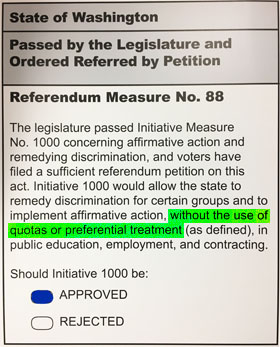 ► In the Seattle Times — The Times recommends: Approve Referendum 88 for societal equality (editorial endorsement) — Diversity makes institutions stronger, but good intentions are not enough to lift the unfair burden of societal inequality. Our public institutions must actively work to reflect the communities they serve… One (reader) asked whether it guarantees institutions the right to select only qualified persons. It does. The law explicitly forbids establishing quotas or selecting a less-qualified applicant solely on the basis of membership in a historically disadvantaged or underrepresented group… As one of only eight states to ban affirmative-action policies, Washington has been disadvantaged in recruiting a diverse pool of talented students and faculty. Referendum 88 gives voters the power to eliminate that competitive disadvantage, enabling our state’s public colleges and universities to recruit a diverse pool of excellent students and faculty, enriching the educational experience of all.
► In the Seattle Times — The Times recommends: Approve Referendum 88 for societal equality (editorial endorsement) — Diversity makes institutions stronger, but good intentions are not enough to lift the unfair burden of societal inequality. Our public institutions must actively work to reflect the communities they serve… One (reader) asked whether it guarantees institutions the right to select only qualified persons. It does. The law explicitly forbids establishing quotas or selecting a less-qualified applicant solely on the basis of membership in a historically disadvantaged or underrepresented group… As one of only eight states to ban affirmative-action policies, Washington has been disadvantaged in recruiting a diverse pool of talented students and faculty. Referendum 88 gives voters the power to eliminate that competitive disadvantage, enabling our state’s public colleges and universities to recruit a diverse pool of excellent students and faculty, enriching the educational experience of all.
► In The Olympian — The Olympian endorses Referendum 88 — If you vote yes for Referendum 88, you will be in good company: Its supporters include former Republican Governor Dan Evans, former Democratic governors Gary Locke and Christine Gregoire, the Washington State Labor Council, the Washington Education Association, and a host of other community leaders, media, and organizations.
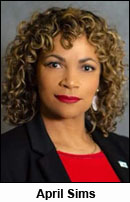 ► MUST-READ in today’s Seattle Times — Affirmative action debate in Washington takes an Orwellian turn (by Naomi Ishisaka) — The campaign (against Ref. 88) uses Orwellian language to call equity efforts “systemic racism” and “racial profiling.” I-1000 opponent Kan Qiu called Jim Crow “government-sanctioned discrimination” and said, “I actually don’t see the difference between [the] Jim Crow law and Initiative 1000.” It is appalling and ahistorical to conflate a codified system of racial apartheid that was upheld through terror, with an effort to create economic and educational opportunities for historically marginalized groups. April Sims, secretary-treasurer of the Washington State Labor Council and a co-chair of the Washington Fairness I-1000 campaign, found Qiu’s remarks offensive. “[It] discounts the real sacrifice that folks made to pass the Civil Rights Act and to overturn those Jim Crow laws, folks that died. The folks that were lynched during the Jim Crow era.” Sims’ own family fled the South to escape the violence of the time. Sims said the divide-and-conquer tactics aren’t new, but they are nonetheless disheartening.
► MUST-READ in today’s Seattle Times — Affirmative action debate in Washington takes an Orwellian turn (by Naomi Ishisaka) — The campaign (against Ref. 88) uses Orwellian language to call equity efforts “systemic racism” and “racial profiling.” I-1000 opponent Kan Qiu called Jim Crow “government-sanctioned discrimination” and said, “I actually don’t see the difference between [the] Jim Crow law and Initiative 1000.” It is appalling and ahistorical to conflate a codified system of racial apartheid that was upheld through terror, with an effort to create economic and educational opportunities for historically marginalized groups. April Sims, secretary-treasurer of the Washington State Labor Council and a co-chair of the Washington Fairness I-1000 campaign, found Qiu’s remarks offensive. “[It] discounts the real sacrifice that folks made to pass the Civil Rights Act and to overturn those Jim Crow laws, folks that died. The folks that were lynched during the Jim Crow era.” Sims’ own family fled the South to escape the violence of the time. Sims said the divide-and-conquer tactics aren’t new, but they are nonetheless disheartening.
► In the (Everett) Herald — R-88 assures best students, workers aren’t overlooked (by Dr. Adam Jonas) — As a physician, I see patients in the hospital who need high quality and high-tech care to survive. Innovation drives our health care industry to improve patients’ quality of life and help patients get well and stay well. But innovation can only happen when the brightest minds are at the table. That’s one of many reasons why we at Kaiser Permanente support Referendum 88; our state needs key talent and ideas from every community.
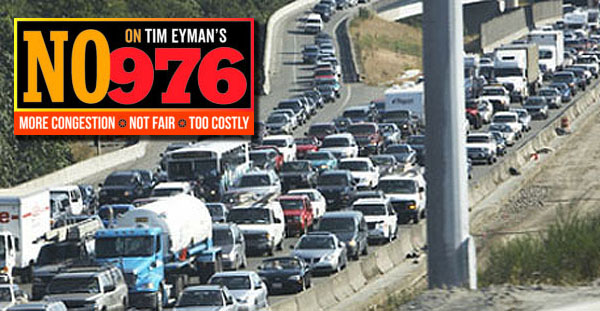
► In the Tri-City Herald — Vote no on Eyman’s I-976. It will devastate the Tri-Cities (by Nickolas Bumpaous and Joel Bouchey) — I-976 hits us where it really hurts: jobs and commerce. Our state’s raw materials, agricultural goods and manufactured products depend on effective traffic corridors. Exports support millions of Washington state families, which is why transportation cuts will slow traffic and our economy. For these reasons and more, our region’s business, labor and environmental leaders have all come together to oppose I-976. It threatens our economy and our environment. It’s just too big a risk. Say yes to mobility and strong communities by voting NO on I-976.
► In the (Everett) Herald — Costs of I-976 would be too great to bear (editorial) — Approval of I-976 would save most vehicle owners some money each year when they renew their tabs. But that savings would quickly be eaten up by the cost of longer commutes, greater wear and tear from bad roads, lost jobs from delayed or canceled construction projects and lost economic opportunities from businesses unwilling to expose employees or their goods and services to more congestion. I-976 is not worth it. Vote no.
► In today’s Seattle Times — Cities try to prepare for potential ‘massive impact’ if car-tab fees slashed by Initiative 976 — I-976 aims to repeal local authority to charge car-tab fees collected through transportation benefit districts. In cities across the state, those fees are used for paving, pothole repair, sidewalk construction and other projects.
LOCAL
 ► In the NW Labor Press — Newly ratified grocery contracts raise wages for 20,000 Oregon and Washington workers — At sites around Oregon and Southwest Washington Oct. 4-11, members of UFCW Local 555 voted to approve more than 90 individual collective bargaining agreements. Negotiated all together, they cover about 20,000 workers at the big grocery employers in Oregon and Southwest Washington, including Fred Meyer, Safeway, Albertsons, and QFC. The agreements run three years. For the first time, they guarantee at least 20 hours a week for workers who want the hours and are available to work them. The agreements also contain substantial wage increases.
► In the NW Labor Press — Newly ratified grocery contracts raise wages for 20,000 Oregon and Washington workers — At sites around Oregon and Southwest Washington Oct. 4-11, members of UFCW Local 555 voted to approve more than 90 individual collective bargaining agreements. Negotiated all together, they cover about 20,000 workers at the big grocery employers in Oregon and Southwest Washington, including Fred Meyer, Safeway, Albertsons, and QFC. The agreements run three years. For the first time, they guarantee at least 20 hours a week for workers who want the hours and are available to work them. The agreements also contain substantial wage increases.
► From the Columbian — Burgerville union announces strike — Members of the Burgerville union announced they will strike at an undisclosed time next week after contract negotiations with Burgerville USA broke down on Friday. The union spans five locations in Oregon and none in Vancouver. Union members also plan to camp overnight on Thursday at Burgerville’s corporate office in Vancouver, at 109 W. 17th St.
► In the Oregonian — Burgerville union forms picket line in Portland after contract talks fail — Burgerville Workers Union marched to the fast food chain’s Hawthorne location in Portland on Saturday and set up a picket line around the restaurant’s perimeter for about two hours.
BOEING
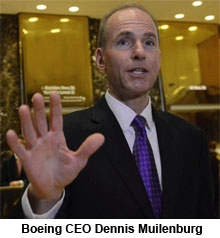 ► In the Seattle Times — Stunning messages from 2016 deepen Boeing’s 737 MAX crisis — Boeing’s MAX crisis deepened Friday with new controversy around an exchange of bantering texts between senior pilots that suggested Boeing knew as early as 2016 about the perils of a new flight-control system later implicated in two crashes in Indonesia and Ethiopia that killed 346 people. The exchange of messages in 2016 between the two lead technical pilots on the Boeing 737 MAX program was released Friday after regulators blew up at the company for belatedly disclosing the matter. The messages reveal that the flight-control system, which two years later went haywire on the crashed flights, was behaving aggressively and strangely in the pilots’ simulator sessions.
► In the Seattle Times — Stunning messages from 2016 deepen Boeing’s 737 MAX crisis — Boeing’s MAX crisis deepened Friday with new controversy around an exchange of bantering texts between senior pilots that suggested Boeing knew as early as 2016 about the perils of a new flight-control system later implicated in two crashes in Indonesia and Ethiopia that killed 346 people. The exchange of messages in 2016 between the two lead technical pilots on the Boeing 737 MAX program was released Friday after regulators blew up at the company for belatedly disclosing the matter. The messages reveal that the flight-control system, which two years later went haywire on the crashed flights, was behaving aggressively and strangely in the pilots’ simulator sessions.
► In the Washington Post — Messages show Boeing employees knew in 2016 of problems that turned deadly on the 737 MAX — Mark A. Forkner, then chief technical pilot for Boeing’s 737 who had a major role in the Max, wrote: “So I basically lied to the regulators (unknowingly).”
► In today’s Seattle Times — Boeing denies pilot messaging chat shows prior knowledge of 737 MAX flight control problem — Boeing insisted Forkner’s “comments reflected a reaction to a simulator program that was not functioning properly,” as opposed to a flawed system design.
THIS WASHINGTON
 ► From The Columbian — Long leads in 3rd Congressional District fundraising — Democrat Carolyn Long declared she would seek Washington’s 3rd Congressional District seat for the second time on July 8. Since then, she’s out-raised both the Republican incumbent and her fellow Democratic primary challenger. Long, a Washington State University Vancouver professor, received $597,307 in campaign donations between July 1 and Sept. 30. The 4,800 individual donations came from around 3,200 contributors, and 91 percent of them came from within Washington state — figures that demonstrate the “local, grassroots strength of the campaign,” Long said.
► From The Columbian — Long leads in 3rd Congressional District fundraising — Democrat Carolyn Long declared she would seek Washington’s 3rd Congressional District seat for the second time on July 8. Since then, she’s out-raised both the Republican incumbent and her fellow Democratic primary challenger. Long, a Washington State University Vancouver professor, received $597,307 in campaign donations between July 1 and Sept. 30. The 4,800 individual donations came from around 3,200 contributors, and 91 percent of them came from within Washington state — figures that demonstrate the “local, grassroots strength of the campaign,” Long said.
ALSO sat The Stand — WSLC endorses Carolyn Long for Congress in 3rd District
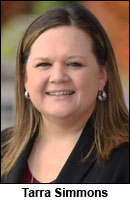 ► From KNKX — Former inmate-turned-attorney to run for open statehouse seat — A Washington attorney and criminal justice reform advocate who previously served time in prison is seeking to become the first formerly incarcerated person elected to the Washington Legislature, at least in modern times. Tarra Simmons, of Bremerton, who in 2017 won a Supreme Court fight to sit for the state bar exam, despite her prior criminal conviction, formally announced her candidacy for the state House on Monday. Simmons will run in 2020 as a Democrat for an open House seat being vacated by Rep. Sherry Appleton (D-Poulsbo) in the 23rd Legislative District.
► From KNKX — Former inmate-turned-attorney to run for open statehouse seat — A Washington attorney and criminal justice reform advocate who previously served time in prison is seeking to become the first formerly incarcerated person elected to the Washington Legislature, at least in modern times. Tarra Simmons, of Bremerton, who in 2017 won a Supreme Court fight to sit for the state bar exam, despite her prior criminal conviction, formally announced her candidacy for the state House on Monday. Simmons will run in 2020 as a Democrat for an open House seat being vacated by Rep. Sherry Appleton (D-Poulsbo) in the 23rd Legislative District.
EDITOR’S NOTE — SImmons was part of a Campaigns for Social Justice panel at the 2019 WSLC Convention.
THAT WASHINGTON
► From ARS Technica — Senators propose near-total ban on worker noncompete agreements — A bipartisan pair of senators has introduced legislation to drastically limit the use of noncompete agreements across the U.S. economy. “Noncompete agreements stifle wage growth, career advancement, innovation, and business creation,” argued Sen. Todd Young (R-Ind.). He said that the legislation, co-sponsored with Sen. Chris Murphy (D-Conn.), would “empower our workers and entrepreneurs so they can freely apply their talents where their skills are in greatest demand.”
 ► In the Washington Post — This nurse worked more than 30 years at the same hospital. Then the pension plan went bust. (by Michelle Singletary) — An exemption in the law excludes religious-affiliated pensions from being covered under ERISA. The exemption applies to church-related tax-exempt organizations, which includes some hospitals. Although such entities can choose to be covered by Pension Benefit Guaranty Corp., there’s no requirement that they pay for the insurance. St. Clare’s Hospital in Schenectady, N.Y., wasn’t covered. Now Juanita Aikens-English, 64, who began collecting her pension checks early after 30 years of service at the hospital, will get no more checks… As I reviewed the facts in this case, it’s clear to me that Congress needs to revisit the religious-affiliated pension plan exemption. Or many more people might find out too late that a promised safety net has vanished.
► In the Washington Post — This nurse worked more than 30 years at the same hospital. Then the pension plan went bust. (by Michelle Singletary) — An exemption in the law excludes religious-affiliated pensions from being covered under ERISA. The exemption applies to church-related tax-exempt organizations, which includes some hospitals. Although such entities can choose to be covered by Pension Benefit Guaranty Corp., there’s no requirement that they pay for the insurance. St. Clare’s Hospital in Schenectady, N.Y., wasn’t covered. Now Juanita Aikens-English, 64, who began collecting her pension checks early after 30 years of service at the hospital, will get no more checks… As I reviewed the facts in this case, it’s clear to me that Congress needs to revisit the religious-affiliated pension plan exemption. Or many more people might find out too late that a promised safety net has vanished.
► In today’s NY Times — Why Trump dropped his idea to hold the G7 at his own hotel — He knew Democrats would criticize him. When Republicans started doing so, he changed his mind.
NATIONAL
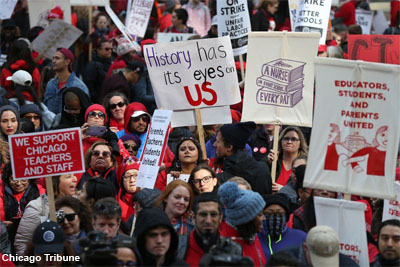 ► In today’s Chicago Tribune — ‘We could end this within a couple days,’ Chicago Teachers Union president says at beginning of third day without classes — Monday was the third day without classes in Chicago public schools, with picket lines remaining up around the city as union officials reported some progress during weekend talks.
► In today’s Chicago Tribune — ‘We could end this within a couple days,’ Chicago Teachers Union president says at beginning of third day without classes — Monday was the third day without classes in Chicago public schools, with picket lines remaining up around the city as union officials reported some progress during weekend talks.
► In today’s Detroit News — UAW-GM strike day 36: Members reviewing contract details — The 48,000 members of the United Auto Workers remain on strike as they review the details of a tentative agreement with General Motors Co. Monday is the 36th day of one of the longest strikes against GM in history and marks six weeks since the union members left assembly lines for picket lines. UAW leaders voted to keep members out on strike while they review details and vote on the tentative plan. Members across 55 GM facilities in 19 states are supposed to turn their ballots in by Friday, Oct. 25.
► In the Washington Post — The GM strike is one of the largest in decades. Other unions say it is inspiring them. — The strike is part of an uptick in workplace organizing in recent years, raising hopes that unions could end their decades-long slide.
► From the Morning Call — Striking Mack Trucks workers irked after company cuts their health care plans — Striking Mack Trucks workers are expressing frustration after the company cut their medical coverage, something employees say they didn’t realize had happened until they tried to pick up a prescription or visit a doctor’s office.

► In the NY Post — Amazon workers ‘forced to go back to work’ after fellow employee dies on shift — An Amazon worker in apparent cardiac arrest was lying on the floor of a warehouse for 20 minutes before anyone noticed, according to a report. Billy Foister, 48, who scanned and stocked shelves for the internet giant, collapsed at an Etna, Ohio, facility just a week after he’d visited a medical clinic complaining of chest pains and a headache. He was given two beverages to combat dehydration and sent back to work, the Guardian reported. Foister’s brother, Edward, told the paper he was shocked his brother was on the floor dying for so long before an Amazon floor monitor spotted him. “How can you not see a 6-foot-3-inch man laying on the ground and not help him within 20 minutes? A couple of days before, he put the wrong product in the wrong bin and within two minutes, management saw it on camera and came down to talk to him about it,” Edward Foister said.
► From Vox — Google’s attempt to shut down a unionization meeting just riled up its employees — A group of dozens of full-time Google employees at the company’s largest European office, which is located in Zurich, Switzerland, met to discuss unionization on Monday in defiance of their employer’s attempt to cancel the meeting. The tensions surrounding this meeting reflect Google’s growing struggles with employee discontent over workplace issues that go beyond just labor organizing.
► From HuffPost — Worker injured in deadly Hard Rock Hotel collapse now faces deportation — The Honduran is part of a lawsuit with other construction workers who are seeking damages for their injuries sustained from the tragic accident in New Orleans.
TODAY’S MUST-READ
 ► From USA Today — Are unions back? GM, Chicago teacher strikes show how unions can start winning again –To special education teacher Maggie Sermont, the rationale for a strike against Chicago’s public schools boils down to a simple “enough!” And more workers are joining the call by showing a willingness to strike, reawakening the nation’s organized labor movement after decades of mostly small gains. Unions are making a powerful comeback. Americans approve of labor unions by 64%, only two percentage points shy of the highest mark recorded in the past 50 years and 16 points above the low in 2009, Gallup reported two months ago. Last year, there were 20 major work stoppages across several industries, the highest total since 2007. The strikes and walkouts included a lot of school districts, but also big corporate names like AT&T and Marriott. The number of workers involved, 485,000, was the highest since 1986, the Bureau of Labor Statistics reports.
► From USA Today — Are unions back? GM, Chicago teacher strikes show how unions can start winning again –To special education teacher Maggie Sermont, the rationale for a strike against Chicago’s public schools boils down to a simple “enough!” And more workers are joining the call by showing a willingness to strike, reawakening the nation’s organized labor movement after decades of mostly small gains. Unions are making a powerful comeback. Americans approve of labor unions by 64%, only two percentage points shy of the highest mark recorded in the past 50 years and 16 points above the low in 2009, Gallup reported two months ago. Last year, there were 20 major work stoppages across several industries, the highest total since 2007. The strikes and walkouts included a lot of school districts, but also big corporate names like AT&T and Marriott. The number of workers involved, 485,000, was the highest since 1986, the Bureau of Labor Statistics reports.
EDITOR’S NOTE — Had “enough” yet? If you’re tired of being disrespected at work, maybe it’s time for form a union. Find out more about how you can join together with co-workers and negotiate a fair return for your hard work. Or go ahead and contact a union organizer today!
The Stand posts links to Washington state and national news of interest every weekday morning by 10 a.m.





